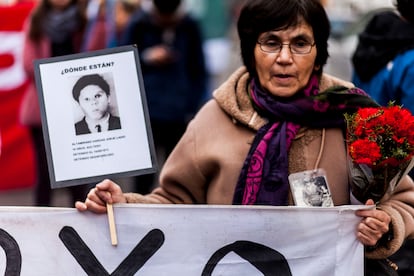The seeking mothers of Latin America: without fear and with memory
In Latin America several tragedies have come together and we have accumulated an untold number of missing persons

The eyes of the earth are in the Atacama desert, in northern Chile. Scientists confirm that the most powerful telescopes in the world are there, in that infinite space, the driest on the planet, which is also the only one that blooms once a year: they call it the flowery desert. There, in the middle of an immense nothingness, dozens of women forged a story of bravery, of a painful and serious bravery that is replicated in every corner of the continent. The women of Calama became famous for decades searching for their children, brothers, and husbands who disappeared during the dictatorship of Augusto Pinochet (1973-1990), a regime that murdered, tortured, and disappeared more than 40,000 people inside and outside Chilean territory. In Nostalgia for the Light, a 2010 documentary by the Chilean Patricio Guzmán, several of these women drag their feet and touch the earth. They became experts at knowing the difference between a stone fragment and a human bone fragment. “I wish telescopes didn’t just look at the sky, but could go through the earth to be able to locate them,” says one of them while the sun tans her face full of wrinkles and sadness.
***
It is 1978, on the other side of the Andes Mountains. The World Cup in Argentina, which is being held in the midst of the dictatorship of Jorge Rafael Videla, has the whole world excited. The international press that covers it observes a group of women with white headscarves; they march in circles in the Plaza de Mayo. They are barely a dozen, they carry photographs of their disappeared relatives from their necks to their chests. They were called the “crazy mothers” until a journalist from Dutch television approached them and their voices began to echo. “Why don’t they tell us if they are alive or dead? We are looking for that, nothing more. Let them answer us and then we will leave”, says one. The words of each other are crowded, and this video document remains for posterity. The voices in a suppressed cry, the desperation and the hope that at last, in front of that camera, something of their claim will be heard. “We no longer know who to turn to: consulates, embassies, ministries, churches… doors have been closed to us everywhere. That is why we beg you, you are our last hope: please help us!” they say, stumbling in front of the journalist. When the mothers and grandmothers of Plaza de Mayo explain in several interviews the reason for the white scarf, they allude to motherhood. They want that cloth they used as diapers to change their children when they were babies to be the hallmark of their movement. The struggle of these women has not only transcended in the creation in Argentina of the National Genetic Data Bank, which identifies those who during the dictatorship were illegally appropriated by the military regime and given away to families. It has also inspired the so-called “green wave” of the fight for legal and safe abortion and the symbolic scarf of that color that the Latin American and world feminist movement has adopted as its own. It is no coincidence that the women of Latin America, generation after generation, continue to seek to change the world.
***
And they are changing it, or at least they are shaking it up. With protests, searching in deserts, stirring up land and sea. Or writing letters. ”I had to look for my son no matter how or where. We went to the radio stations to explain what was happening to us, we stuck flyers with information about my Dany on poles and crowded places, and from those places I understood your indifference. My son’s absence hurts me like the 100,000 who are not in our beautiful Colombia today. But I confess, your total indifference hurts me deeply. I inform you that there are 82,998 missing persons in Colombia, 9,000 in Valle del Cauca and 6,400 in the city of Cali. Too many, right?”, says a letter written in 2019 by María Cecilia Tuestar Álvarez, who has been looking for her son since December 28, 2013. Like María, several dozen mothers caught the attention of the press, when they climbed on public transit buses in the city of Cali, in the department of Valle del Cauca, to distribute letters where they told their stories of how their sons or daughters had disappeared. In Colombia, in recent decades the terrors of an internal conflict have been added, which despite the signing of peace agreements with the FARC guerrillas, has not completely ceased. There, people have been disappeared by guerrilla groups, paramilitary groups, criminals or state agents. And according to official figures, the disappeared in that country exceed those of the dictatorships of several South American countries during the 20th century.
***
But dictatorships and armed conflicts are not the only breeding ground for the disappearance of people in Latin America. Since the early 2000s, with the increase in migration flows on the continent, things have gotten worse. And just as migrant caravans are created from time to time in Central America, so also the caravans of mothers looking for their sons and daughters began to follow them, who headed for other countries in search of a better life and disappeared. As if disappearing were a natural possibility of travel, a form of everyday life. The Central American mothers are perhaps the most visible example of a tragedy that chains several others behind it. Since 2004, they come to Mexico City every year from El Salvador, Honduras, or Guatemala organized through the Mesoamerican Migrant Movement, following a route similar to the one they imagine their loved ones took. They demand and shout, they bring sadness on their backs, and they don’t get tired and they don’t forget. They are foreign mothers in a country that has taken away what they love most in life. And with that, they also take away their fear.***From the Atacama desert to Sonora, these women have everything in common. They are victims of absent, ineffective governments, of indifferent societies, of vacuums. They, who are stirring up everything in their search to find what this world has taken from them, teach us everything on their way.
***
In 2021, Ceci Flores, the leader of the Searching Mothers of Sonora, in northern Mexico, explained everything she had learned in the six years she had been searching for her two missing children: how she differentiated bones, how she knew when the earth had been removed. Searchers like her only lack knowledge in DNA identification to be able to complete the tasks that the authorities do not do. “What we do hinders them. We have found the bodies that they have not been able to find. They don’t because they don’t want to. We are already almost 900 mothers throughout the State. We have found almost 300 bodies, and located more than 50 people alive,” she says. In a conversation with Socorro Gil, whose son disappeared in Acapulco, Guerrero, after being detained by municipal police in 2020, she explained that in northern Mexico she had been taught to identify the characteristics of the land to dig. I was in a hurry and with a full agenda. She had a couple of trips planned to Tijuana and Monterrey for “some research.” When I asked her the reasons why she was going to the other end of the country and far from where her son had disappeared, she replied: “We have the idea that we know where they pick up (kidnap) our children, but we do not know where they are going. leave. So, if we can tour the entire Mexican Republic, we are going to do it. And if I don’t find my son, maybe I find another mother’s son,” she said.

***
In Latin America several tragedies have come together and we have accumulated an untold number of missing persons. But, for each one of those people “erased” from the map by state agents, by a guerrilla, a paramilitary group or a dictatorial regime, there are several tens of thousands of women who wake up every day, without resources, mostly, but also without fear, and with the only certainty that they are going to find something, although they do not know exactly what it is. And that is, possibly, one of the best examples that Latin American women are bequeathing to the entire world.
Tu suscripción se está usando en otro dispositivo
¿Quieres añadir otro usuario a tu suscripción?
Si continúas leyendo en este dispositivo, no se podrá leer en el otro.
FlechaTu suscripción se está usando en otro dispositivo y solo puedes acceder a EL PAÍS desde un dispositivo a la vez.
Si quieres compartir tu cuenta, cambia tu suscripción a la modalidad Premium, así podrás añadir otro usuario. Cada uno accederá con su propia cuenta de email, lo que os permitirá personalizar vuestra experiencia en EL PAÍS.
¿Tienes una suscripción de empresa? Accede aquí para contratar más cuentas.
En el caso de no saber quién está usando tu cuenta, te recomendamos cambiar tu contraseña aquí.
Si decides continuar compartiendo tu cuenta, este mensaje se mostrará en tu dispositivo y en el de la otra persona que está usando tu cuenta de forma indefinida, afectando a tu experiencia de lectura. Puedes consultar aquí los términos y condiciones de la suscripción digital.









































